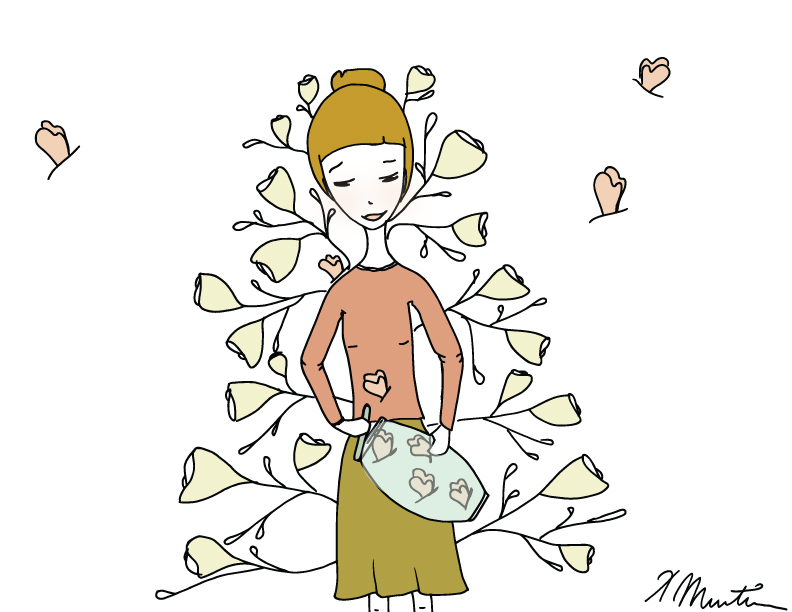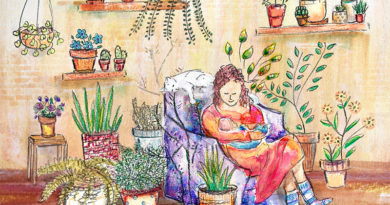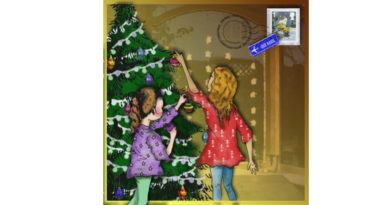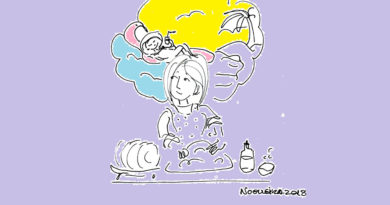Learning to Laugh Properly

I like to laugh. Not all the time, but every now and then. I feel it’s a good, healthy thing to do, and, well, it’s fun.
To use a musical term, one could say that yes, my laugh is somewhat forte. It’s a nice, round-bellied laugh from deep within. I always imagined most people would like that sort of a laugh, at least when they’re experiencing it themselves. Or so I thought.
I first moved to Switzerland in the era before kids, when I used to frequent those delightful types of recreational establishments known as restaurants. I’m not talking about the ones with the wild kiddy corners where you have to crouch on bright blue-and-green plastic Ikea stools amongst toys, holding your latte up out of harm’s way. I remember the distinct, uncanny feeling that I would get when I laughed. It seemed to me that everything went suddenly quiet and a lot of heads turned; I thought I must be imagining things. But when my then Swiss boyfriend mentioned that his friends described me as “the one who laughs,” I wasn’t so sure anymore. Especially as he made it sound like the title of a B-class horror movie.
I would like to underline at this point that I am most certainly not one of those people who laughs incessantly and is jolly all the time. I have my moods and I also like a good grump. Especially since having kids, I find there’s not that much time available for laughing, and I often leave it to them. That said, though, as things are easing up from the “donkey years” (see my article “The Culture Behind Motherhood,” October 2014), we now increasingly often enjoy a good family chuckle, most recently in the cable car on our way up to the ski slopes and round the Christmas tree before the kids dived towards their presents. And I’m very proud to say even round the table at lunchtime during one of the lunches I am learning to produce relatively punctually at half-past midday on a daily basis.
But I do distinctly remember the moment when I found myself shushing my children when they were small. Once in the tram, and again on my only jog ever, I believe it was, with the Dolphin bicycle trailer (can’t say I didn’t try), because they were laughing. They weren’t having uncontrolled silly attacks, just well-meaning, I’m-happy-and-life-is-fun laughs. I remember being acutely aware of people looking our way. Some of them did smile back, especially with the bicycle trailer. It was very cute. In fact, the children began waving at people, and they got some waves and even some laughs back. I did realize, however, that this was not something I could let them do excessively. It was all right up to a point.
It was then I knew that I had to act. I’m all for respecting other cultures and adapting but I most certainly did not want to live in an environment where I would end up practically forbidding my children to laugh. I simply decided that, where laughter is concerned, I would not adapt. I decided to tell the kids that sometimes it’s OK to be different, to stand out, and to risk being stared at. I believe we have found a healthy balance.
When we moved to a different part of town, I decided to make it my mission to show that things can be done in a different way and that different isn’t necessarily threatening. Bruderholz is an elevated part of town set slightly outside the centre with a village-like setup, which was perfect for such an experiment. I made a point of greeting every person I met with a friendly Guten Tag and a smile. Of course, the initial euphoria has settled and I have days where I may need someone else’s smile to cheer me up. Still, I am continually amazed at how people react to us during our daily walks with our wonderful beagle. In fact, a lot of them seem to really enjoy it. I get a lot of smiles back, and even though it may not be a laugh, it does make life so much more agreeable.
By Karin Mohler
Karin Mohler has lived in between cultures for her entire life and has come to the conclusion that this will always be a big part of her. Having no roots doesn’t bind her anywhere in particular, but she is careful not to impose that sense upon her children, who have been born and bred in Switzerland. She has taken a lot of inspiration for understanding her “in-betweenness” from the book Third Culture Kids: Growing Up Among Worlds, by D. C. Pollock and R. v. Reken (2009).
Illustration by Laura Munteanu
Laura has studied Journalism and Advertising, and has been working as a journalist and an illustrator. She has been illustrating for magazines, websites, charity and diverse campaigns. She lives in Zurich with her husband and six-year-old daughter.




I remember coming to Switzerland in 1991, having never lived abroad. Living in a small Swiss village, I was afraid to speak English too loudly. A trip to a Sprüngli cafe in Zurich helped me get over it. I heard the voices of unashamed English speakers there and loosened up about being different.